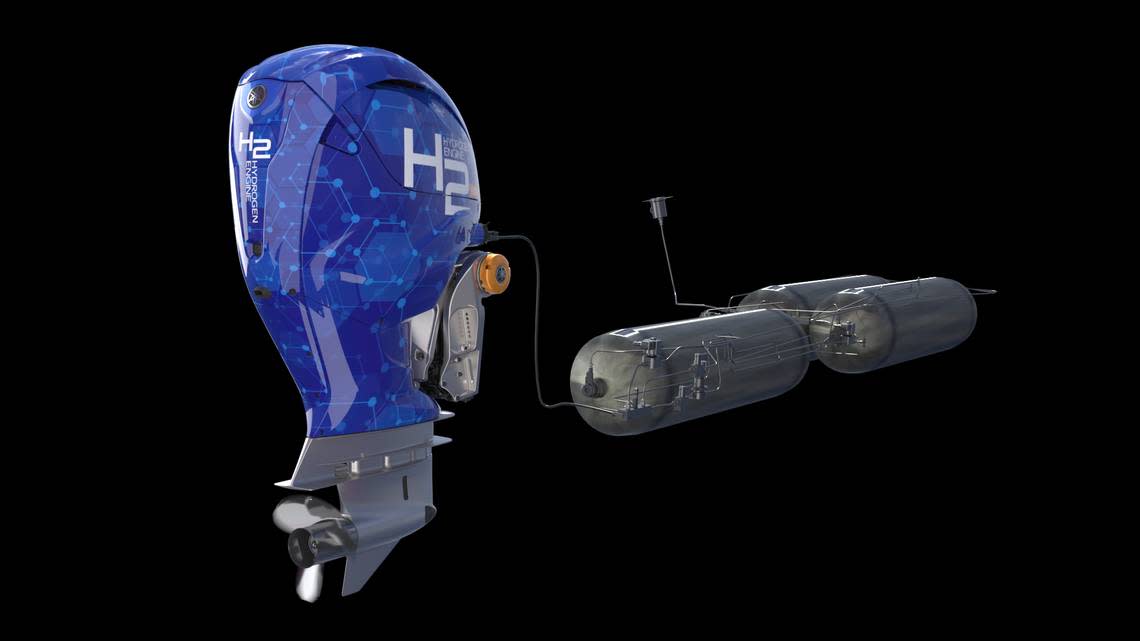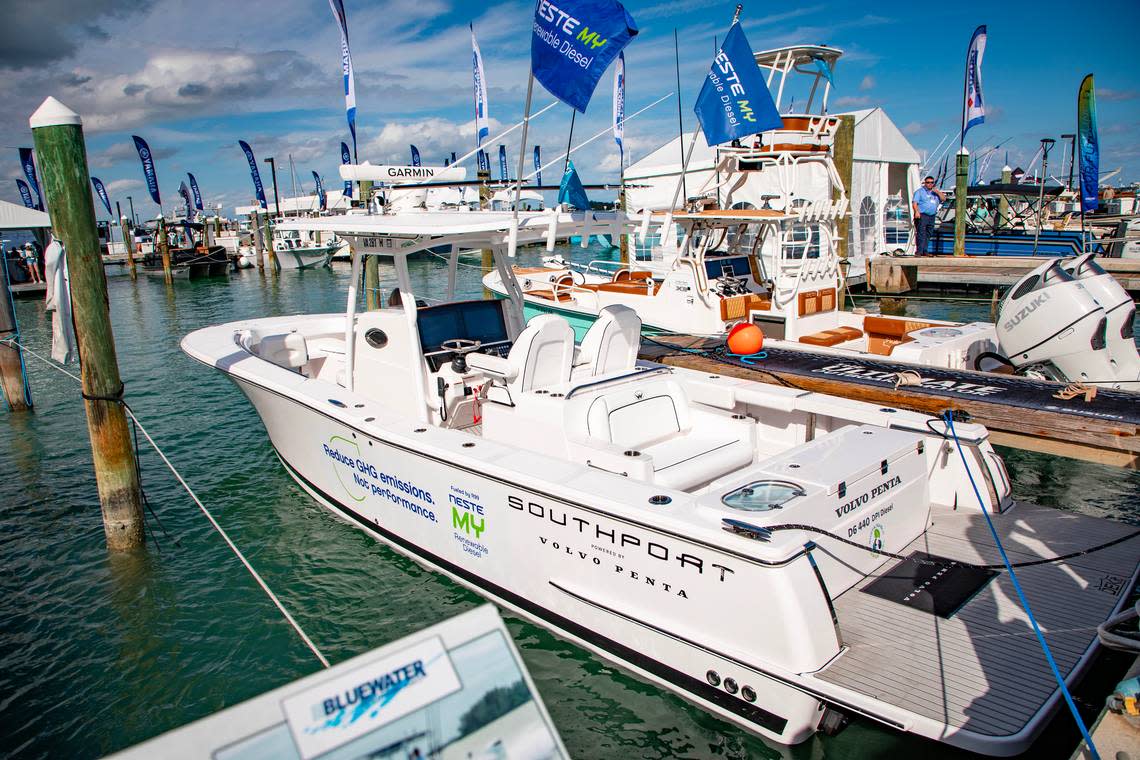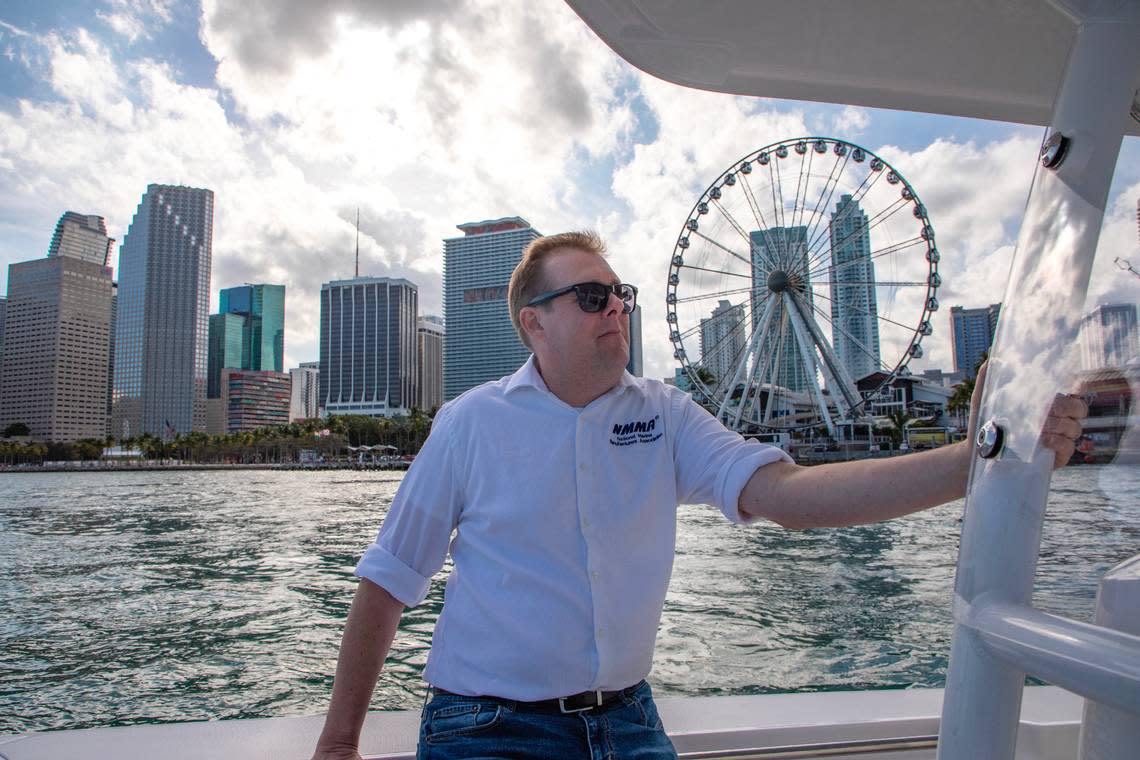First boat powered by ‘fuel of the future’ debuts in Miami. You can’t buy it ... yet
A cutting-edge boat design was unveiled this week at the Miami International Boat Show— the world’s first recreational boat powered by a Yamaha engine built to run on what’s often billed as the fuel of the future, hydrogen.
Don’t go look for prices anytime soon. It’s not for sale yet, hasn’t been tested in Florida waters and remains far from production for regular boaters. But it represents a growing wave from a marine recreational boat industry that is seeking innovative ways to reduce fossil fuel emissions that drive climate change.
“We love this idea of being on the forefront of the revolution,” said Grant Suzuki, chief of technology in marine systems at Yamaha, during an event debuting the technology on Wednesday. “We don’t believe there is a single way to meet net neutrality.”
Read More: How to navigate boat show traffic
But it’s much more challenging to reduce emissions at sea than it is on land. For starters, industry experts say it takes 10 times as much energy to power a boat than a car. So, roughly speaking, while an electric car might get 350 miles a boat would only make it 35 miles off of the same power.
“At the end of the day our goal as an industry is to reduce CO2 emissions and it’s very different than what you see in automotive,” said Jeff Wasil, director of environment at the National Marine Manufacturers Association (NMMA), which also owns the boat show.
Wasil said while cars sit in traffic, most boats sit at the marina unused most of the time. Being underutilized and having a longer lifespan may require multiple battery changes, and manufacturing the replacement batteries adds to the boat’s carbon footprint.

A recently published 600-page peer-reviewed report commissioned by the International Council of Marine Industry Associations (ICOMIA) is the most comprehensive breakdown to date on what it’ll take to decarbonize recreational boating. The study looks at nine different types of boats ranging from small inflatables to yachts and their impact on the environment throughout the full life cycle of the vessel. The NMMA, whose members make up the majority of North American boat manufacturers, is collaborating with ICOMIA to get the word out to the industry.
The study revealed there is no one-size-fits-all approach to decarbonizing recreational boating — and going electric actually isn’t the best option for reducing the emissions of most boats. To fit the different sizes and speeds, there will need to be a combination of technology used like greener fuels, hydrogen, electrification and hybrid motors.
Batteries bigger than boats?
Electric motors can’t compete with the range gas gets quite yet. For example, the study said a small boat might be able to make 166 miles over 14 hours from fossil fuel or replacement fuel. For an electric boat to match that range, the battery would be be bigger than the boat — and make it 820 percent heavier.
It would require even more weight and storage in the boat to meet that small boat’s range with hydrogen. Yamaha acknowledges that the hydrogen boat is still in its infancy and there is a long way to go until boats are built to hold the huge tanks. But one day, consumers might see the value in giving up what might be valuable storage space for some fishing gear for an emissions free ride.
See More: Cool pictures from boats shows of the past
The study said the best way to decarbonize recreational boats by 2025 is to switch to using greener fuels. Some of the marine fuels on the market can even be mixed in and used with fossil gas, with no change on the distance a boat can travel or its performance.
“This is something we can change today, with no change to the engine calibration,” Jason Stimmel, with Suzuki Marine said.
To prove it works, last year Suzuki took a 940-mile trip from Jacksonville to Washington, D.C. powered with EcoGen90, a blend of fossil gasoline and a bio-base made from ethanol that offers a 30% reduction of emissions.

At Herald Plaza, four boats are docked and ready for test rides using a variety of sustainable marine fuels.
Volvo has a boat running on renewable diesel made from used cooking oil and animal fats that are refined into a clear fuel with the same energy as diesel.
With its prototype hydrogen motor Yamaha said it welcomes competitors to work with the company to develop a market, options to deliver fuel and other issues. There are still plenty of questions about costs, how the hydrogen will be produced and what refill stations might look like.
The hydrogen boat was developed in the U.S. but its engine was designed in Japan. Yamaha partnered with Roush, a company famous for racing engines but that has also worked with hydrogen on vehicles and spacecraft for decades. Regulator Marine helped build a boat capable of holding the huge tanks. Together, the companies plan to begin testing the prototype on the water this summer.
“Engineering wise we believe this technology is key to achieve carbon neutrality in the future,” Grant Suzuki, chief of technology in marine systems at Yamaha said.

Ashley Miznazi is a climate change reporter for the Miami Herald funded by the Lynn and Louis Wolfson II Family Foundation in partnership with Journalism Funding Partners.
